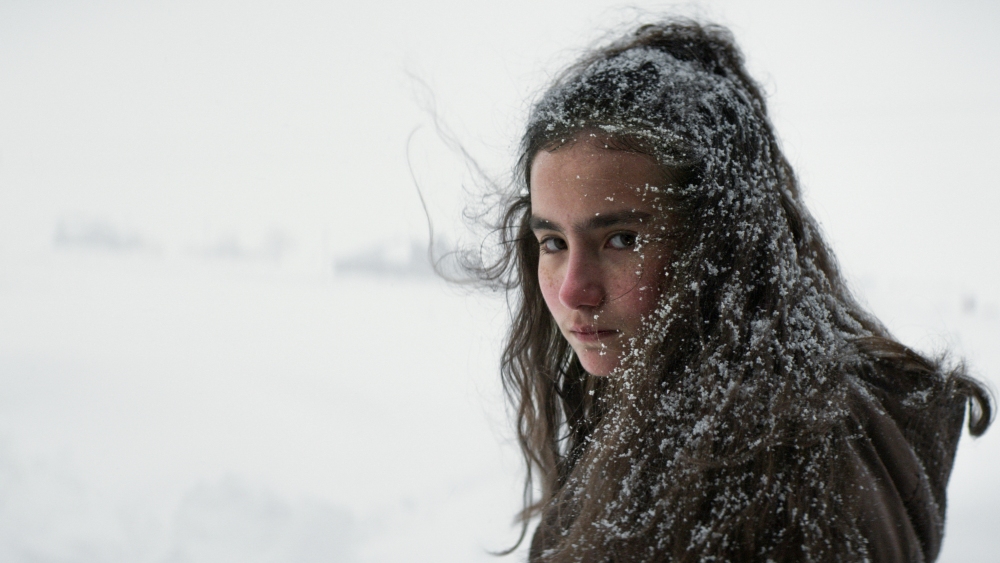
“Does everyone have to be a hero?” The question comes from thirtysomething art teacher Samet (Deni̇z Celi̇loğlu), burst out in frustration in the heat of an intense argument with his fellow educator and would-be girlfriend Nuray (Merve Di̇zdar), as they disagree over just how, or how much, any individual is obliged to contribute to society. It’s a familiar cry from a male protagonist in a film by Turkish director Nuri Bilge Ceylan, even if it hasn’t ever been worded quite so directly: “About Dry Grasses,” his long, languid but slowly captivating ninth feature, is merely his latest work to examine man’s right, for better or worse, to be selfish, to be an anti-hero, to crave attention and isolation all at once, and to talk about it all night long.
That talky impulse in particular has become a signature of Ceylan’s filmmaking, to occasionally enervating effect. For all their abundance of lucidly expressed ideas and ideals, his last two films, “The Wild Pear Tree” and the Palme d’Or-winning “Winter Sleep,” couldn’t escape a sense of rhetorical ventriloquism, with the filmmaker placing his own paragraphs of philosophy in his characters’ mouths.
But where those three-hour-plus films were occasionally essayistic, the similarly super-sized “About Dry Grasses” — a title that sounds almost self-parodically esoteric, a veritable taunt to Ceylan’s detractors — feels novelistic in a most nourishing way. Its longueurs unfurl the prickly desires and discontent of its characters, their circuitous intellectual arguments born of, and further driving, their tensely fraught relationships. At 197 minutes, the film might be overlong by many viewers’ standards, but it’s by no means under-filled: By chapters a bristling classroom drama, a provocative ethics lesson, a bitterly conflicted love triangle and an unsparing anatomy of an everyday misanthrope, it finds Ceylan’s gifts as a dramatist in their finest form since 2011’s “Once Upon a Time in Anatolia.”
If there’s some sense here of a single film acting as an auteur’s greatest-hits collection — no bad thing, when said hits are curated and sequenced just right — it begins with an establishing shot that just about any scholar of contemporary art cinema could pick out as Ceylan’s: Against a sprawling, snow-blanketed slice of the Eastern Anatolian steppes, the camera watches from afar as a lone, darkly clad figure trudges his way through the wailing weather, toward his home in a squat little village. This is western city native Samet’s fourth year of teaching in this harsh locale (a mandatory assignment under the rigors of the Turkish public education system) and he’s learned that winter consumes half the year there — just one reason why he’s restless for a transfer.
At the village elementary school, the outwardly droll, mild-mannered Samet is popular with his students in a way his dourer colleague and roommate Kenan (Musab Eki̇ci̇), a local son, can’t quite manage. In particular, sweet-natured teacher’s pet Sevim (Ece Bağci, quite remarkable) nurses an innocent crush on Samet that he humors more than he should, repeatedly favoring her in class and offering her modest gifts in recess. But after a love letter from her personal diary is confiscated by another teacher, a distraught Sevim catches him in the act of reading it; soon after, a complaint is leveled against him, Kenan and another male teacher of inappropriate behavior with students.
Though they’re cleared by the education board, the incident has a souring effect on his classroom temperament, as his bottled-up resentment of his impoverished assigned district and its grim prospects begins to spill into both his teaching and his dealings with others. His jovial friendship with Kenan, too, is set on edge, not least when they both fall for Nuray, a disabled, sharp-witted teacher at a larger school in the nearest town. As the three become friends, it’s the better-looking, better-humored Kenan that she flirts with, but it’s Samet that she understands all too well.
It’s not that Nuray doesn’t entirely share his misgivings about his purpose in life, as a teacher and as an individual soul — but she finds a security in community that gives Samet, simultaneously haughty and lonely, no comfort at all. Their opposite but oddly compatible worldviews eventually do battle in the aforementioned post-dinner argument. A protracted but compellingly well-matched intellectual face-off, brilliantly performed by Celi̇loğlu and Di̇zdar, the scene gradually accumulates a most unexpected erotic tension — before a radical Brechtian flourish, one that reorients our entire sense of the film’s hitherto claustrophobically small, minutely mapped world, takes the film into more surprising territory still.
This is Ceylan at his most limber and mischievous, the filmmaking exhibiting a generosity and curiosity that belies the script’s defense of individualist, even isolationist, living, at whatever cost to one’s own happiness. The ennui doesn’t all come from the inside — there’s tacit critique, too, of the social and governmental systems that chip away at the energy and ideals of civil servants with something to contribute to their fellow men and vulnerable children alike. And there’s a sliver of a sense that all is not lost for the agonized Samet, hinted at throughout in the beautiful montages of his own still photography — caringly composed images of the surrounding landscapes and faces that he claims to detest — that punctuate the film’s gently rolling acts. Nuray refers at one point to “the weariness of hope,” which rather encapsulates the compromise “About Dry Grasses” offers the unheroic human condition: Better to be weary with hope than with nothing at all.













